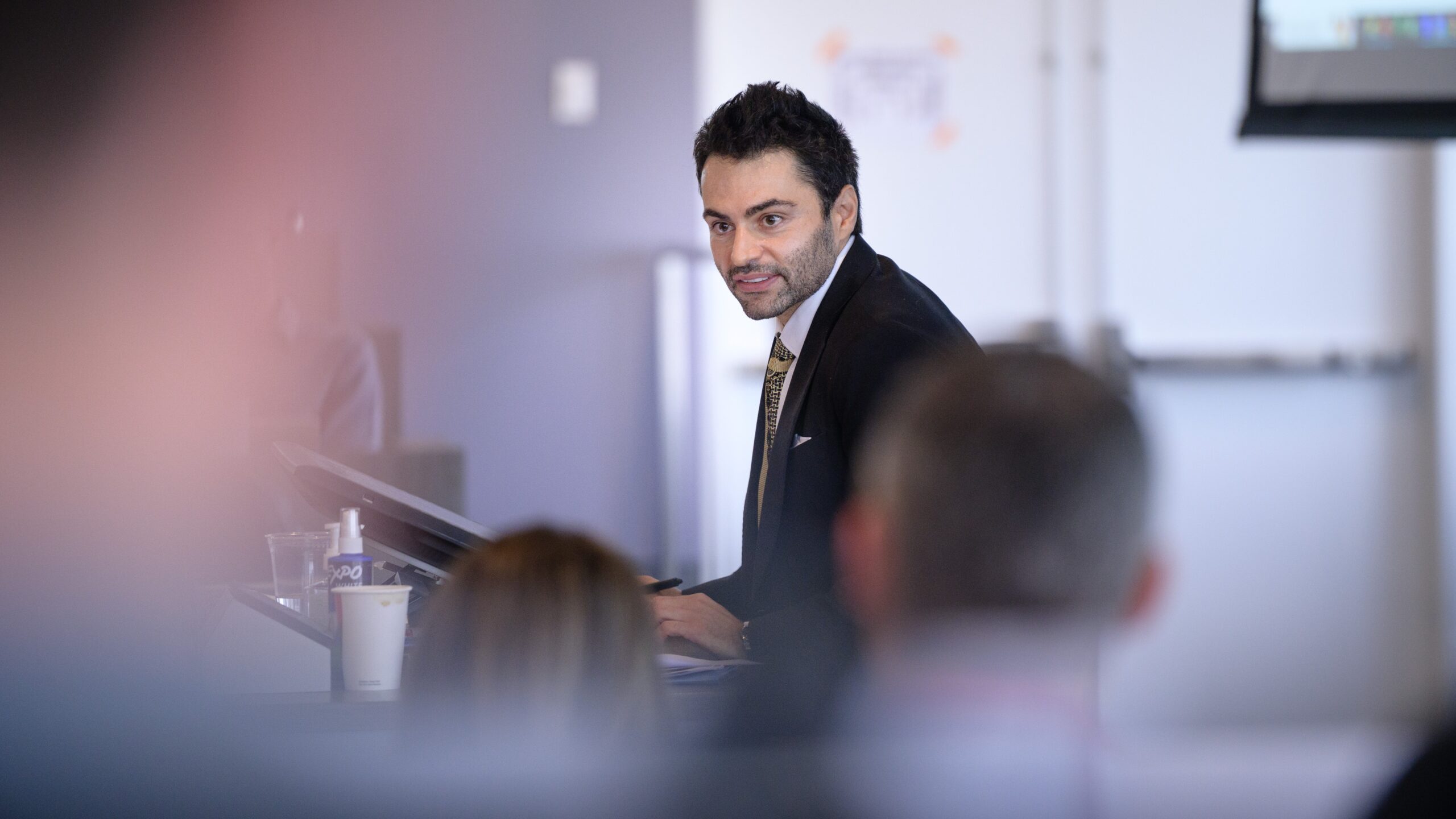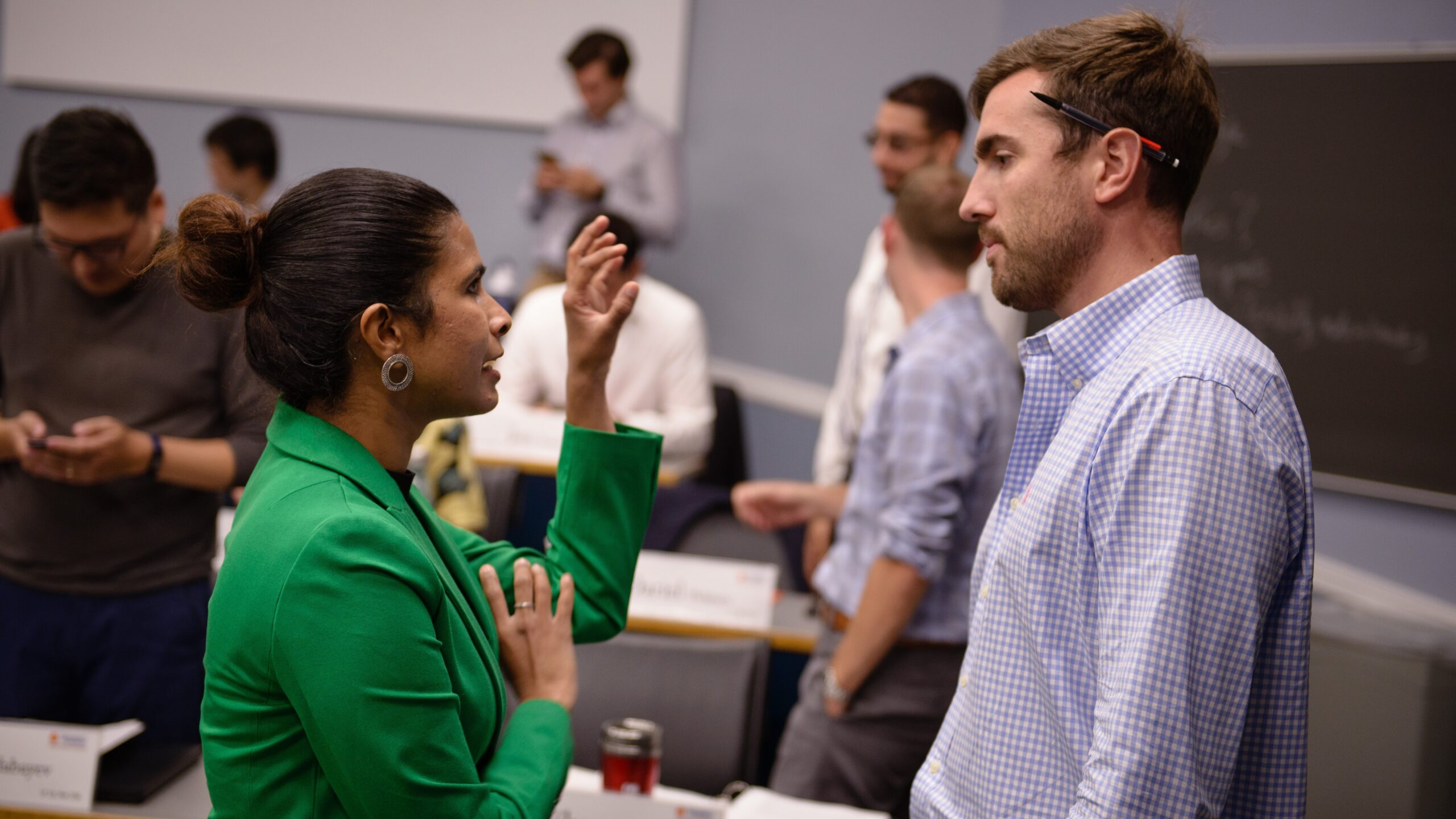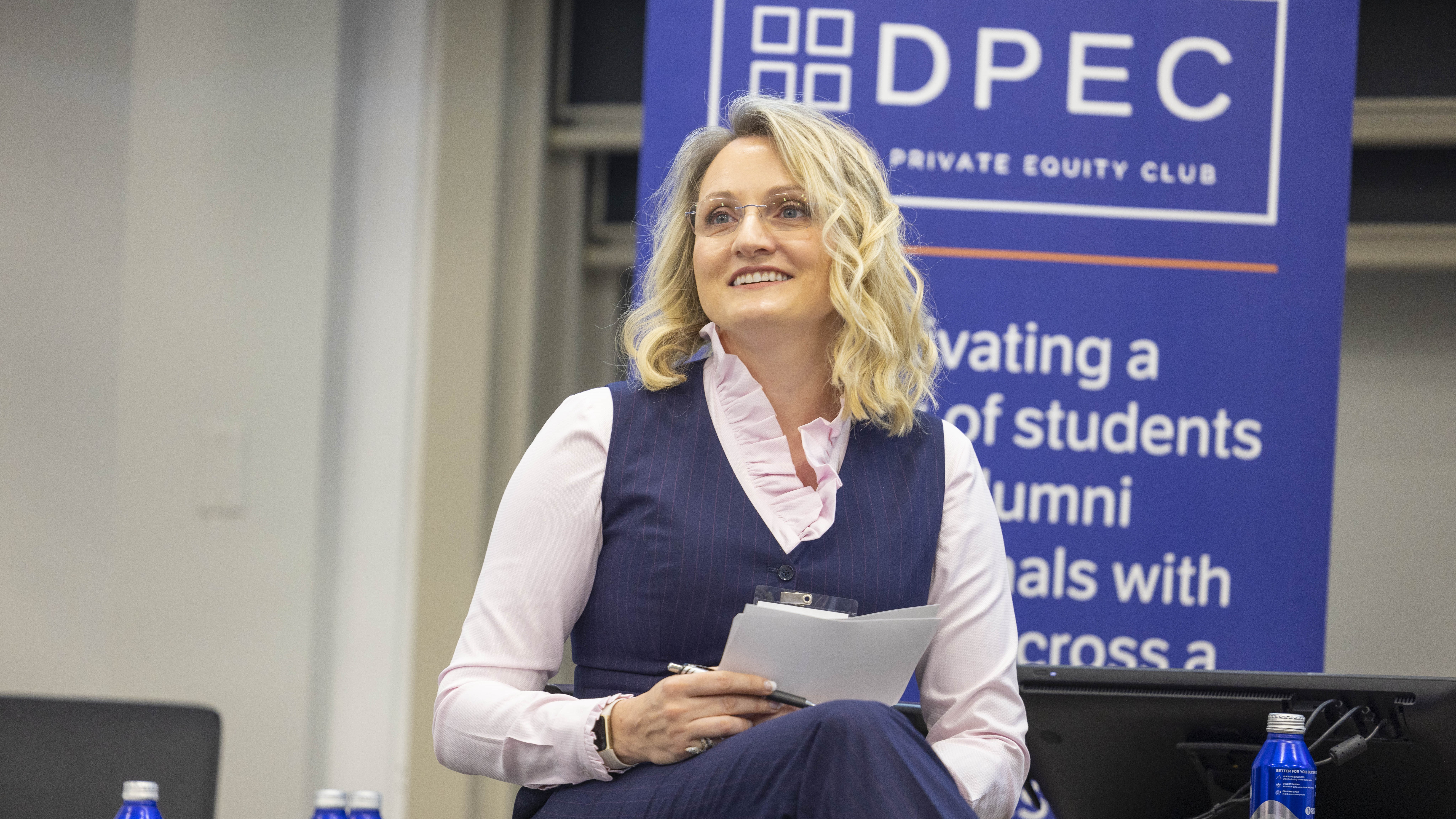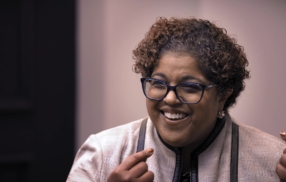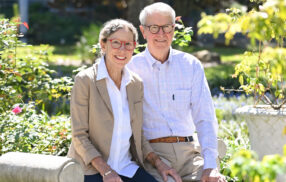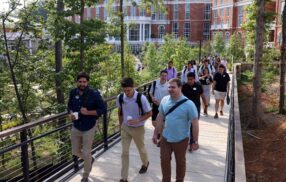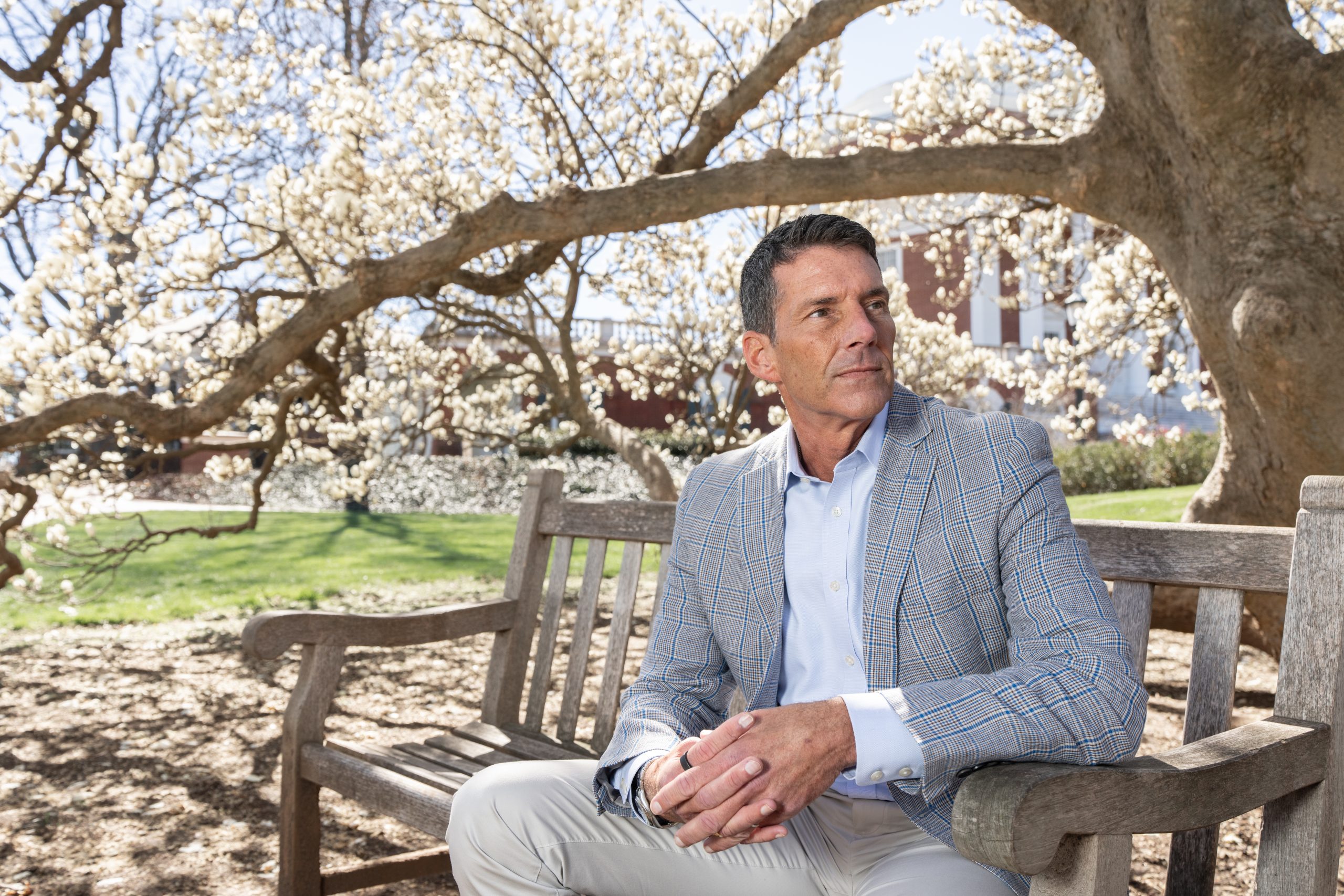
Triathlete Professors: Mastering Teaching, Research and Practice at Darden
By Mike Lenox, Tayloe Murphy Professor of Business Administration, and Yael Grushka-Cockayne, Altec Styslinger Foundation Bicentennial Chair of Business Administration
As Darden professors, we pride ourselves on being “triathletes” — excellent in teaching, conducting research and engaging with practice. Outstanding teachers who provide powerful learning experiences through instruction and course development. World-class scholars who perform research that is both rigorous and relevant to the world. And partners with leaders of companies and organizations who solve problems and identify solutions.
Critically, it is the Darden philosophy that winning “triathletes” are strong precisely because they are strong across these three dimensions. The best professors are not merely the sum of these three separate and independent activities; the best professors emerge through their harmonious integration.
Redefining Classroom Dynamics: The Art of Teaching at Darden
Teaching students is the primary objective and mission of a Darden professor. In some universities, however, this is not the case. There, teaching is secondary, seen as a distraction from the true calling of the professor — conducting research. In such institutions, research rises in primacy while teaching is devalued.
At Darden, this is not the case. We cultivate and celebrate teaching excellence. The faculty expect and demand excellence from one another. We take great pride in Darden’s recognition as the world’s best education experience provided by the world’s best teaching faculty.
Our excellence begins in the “pit” — that wonderful space in the center of the room where a Darden professor masterfully conducts a symphony of voices. As a case-based school, we emphasize student-centered learning where the experiences and insights of students are as valuable as the professor’s words. The role of the professor is to guide, prod and push our students’ thinking, individually and collectively.
While the best among us makes this experience seem effortless, it is truly anything but. Professors spend hours preparing for a single class. What appears like a spur-of-the-moment question during class may be part of a carefully crafted teaching plan to help guide the discussion toward key insights and desired learning objectives. Professors in the Darden core curriculum gather as teaching teams for hours each week, discussing the week’s cases and crafting a collective lesson plan.
To support our work, we develop the teaching materials that form the basis for discussion — writing cases and technical notes, recording video lectures, and creating simulations and experiences. We pride ourselves on course and curriculum development — crafting a series of modules into a cohesive whole that takes students on a journey of discovery. We strive to offer other professors worldwide the tools to embrace the student-centered approach, emphasizing timely, relevant cases based on real leaders and their decision moments.
Our work does not end when class ends. We meet with students during office hours, participate in Darden Cup events, and have students over to our homes for dinner and discussion. We mentor students on research projects. We counsel them on career paths. We serve as trusted advisors.
Beyond the Classroom: The Rigorous Journey of Research
Research is a long, unpredictable process. To obtain insights and results, a researcher must be thorough and rigorous. One needs many consecutive hours. Sometimes, after hours and hours, over months or even years, some research might fail to produce the desired results. With such an important and potentially impactful job as a teacher, you might ask yourself why Darden professors spend so much time doing research.
We conduct research to build expertise and insight that informs the cases we write and the questions we ask in class. Insights that we share with our students and that improve management practice. Crafting courses and curricula must be informed by our in-depth study of critical topics.
Professors build expertise by immersing themselves in the literature, exploring age-old questions and building on the knowledge of those who came before them. They are trained to be observers of the world — collecting data, crafting models and running experiments. They use the past to draw ideas about the future. As professors, we seek to separate the causal from the spurious. We seek to identify the underlying nature of things.
The insights we generate will have broad generalizability. While we may examine the latest trends, we aim to create universal insights that transcend the merely here and now. While any paper might be narrow or esoteric, gradually accumulating small insights leads to better models of navigating our world.
At a world-class institution like Darden, our students should expect nothing less than to be taught by the leading thinkers in their respective fields. Professors who are informing management practice and public policy. Professors who have established global reputations and are frequently sought for their expertise and insights.
From Theory to Practice: Bridging the Gap with Real-World Insights
Many of us on the Darden faculty have spent some time in business. We have experienced corporate life, the challenges of working in the public sector, or have had entrepreneurial experiences.
We became professors not only to inspire and educate leaders through our in-class teaching but also to study, analyze, and solve important and relevant problems that impact business managers and leaders, some of which we experienced and learned about through our ongoing engagement with practitioners.
We love and are intrigued by the business world. We are inspired by hours of conversations, on-the-ground discovery and deep analysis of what we observe in the field. We aim to ensure that the themes chosen from our research matter and stand to impact the world of practice, helping leaders and managers advance their businesses and helping stakeholders solve societal problems. Inspired by what we learn from individual projects, we identify generalizable principles and frameworks.
Our work with practice helps us connect with our students, write timely and relevant case studies, and teach the most relevant methods for solving current problems. We aim to give our students the tools to lead today’s companies in tomorrow’s world. We only do so with our firsthand knowledge and in-depth familiarity with present-day theories and applications. It is a magical moment when we use the results of an engagement with a company to craft our scholarly research and then educate our current MBA candidates and future leaders on the implications of this work.
The Professor as Servant-Leader: A Holistic Approach to Business Education
Ultimately, a professor is a servant-leader to many stakeholders. Our teaching, research and practice are part of an integral whole that defines us. Without one, we would be lesser in the others. Together, they provide a calling — the ranks of which we feel privileged to be a part, thanks to the support of loyal Darden alumni supporters.
Discover how to support Faculty Forward, Milestone II of the Powered by Purpose campaign, at giving.darden.virginia.edu. For tailored guidance, contact Deptury Vice President for Advancement Samantha Hartog at +1-434-981-4025 or HartogS@darden.virginia.edu.
The University of Virginia Darden School of Business prepares responsible global leaders through unparalleled transformational learning experiences. Darden’s graduate degree programs (MBA, MSBA and Ph.D.) and Executive Education & Lifelong Learning programs offered by the Darden School Foundation set the stage for a lifetime of career advancement and impact. Darden’s top-ranked faculty, renowned for teaching excellence, inspires and shapes modern business leadership worldwide through research, thought leadership and business publishing. Darden has Grounds in Charlottesville, Virginia, and the Washington, D.C., area and a global community that includes 18,000 alumni in 90 countries. Darden was established in 1955 at the University of Virginia, a top public university founded by Thomas Jefferson in 1819 in Charlottesville, Virginia.
Press Contact
Molly Mitchell
Senior Associate Director, Editorial and Media Relations
Darden School of Business
University of Virginia
MitchellM@darden.virginia.edu


